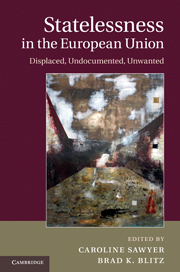Book contents
- Frontmatter
- Contents
- List of contributors
- List of cases
- List of conventions, covenants and treaties
- Acknowledgements
- List of abbreviations and acronyms
- PART I The issue
- 1 Statelessness in the European Union
- 2 Stateless people and undocumented migrants: an Arendtian perspective
- 3 The rights of non-citizens to membership
- 4 Stateless in Europe: legal aspects of de jure and de facto statelessness in the European Union
- 5 Policy responses and global discourses on the rights of non-citizens and stateless people
- PART II The research project
- 12 Conclusions
- Bibliography
- Index
- References
4 - Stateless in Europe: legal aspects of de jure and de facto statelessness in the European Union
from PART I - The issue
Published online by Cambridge University Press: 17 February 2011
- Frontmatter
- Contents
- List of contributors
- List of cases
- List of conventions, covenants and treaties
- Acknowledgements
- List of abbreviations and acronyms
- PART I The issue
- 1 Statelessness in the European Union
- 2 Stateless people and undocumented migrants: an Arendtian perspective
- 3 The rights of non-citizens to membership
- 4 Stateless in Europe: legal aspects of de jure and de facto statelessness in the European Union
- 5 Policy responses and global discourses on the rights of non-citizens and stateless people
- PART II The research project
- 12 Conclusions
- Bibliography
- Index
- References
Summary
Statelessness in international and regional law
While migration is a live topic of political discussion, less attention has been paid to the legal aspects of nationality and citizenship, and statelessness is still more neglected. These issues are sometimes perceived as purely policy issues or, even by lawyers, as small and rare technical legal questions, contentious for few people and essentially anomalous exceptions to the general rule that everyone has a fairly obvious nationality. There is perhaps also some moral difficulty, at least for lawyers, in allowing that the legal system might fundamentally fail some people, offering no jurisdiction within which they can frame their daily lives. But perhaps the greatest problem is that statelessness is essentially negative, and thus difficult to show or even to describe.
The International Court of Justice (ICJ) famously described nationality in 1955 as ‘a legal bond having as its basis a social fact of attachment, a genuine connection of existence, interests and sentiments, together with the existence of reciprocal rights and duties’. Statelessness is the obverse, describing a position of detachment, exclusion and abandonment. In the age of apparently universal basic human rights, citizenship still provides the means through which those rights may be vindicated. The correlation of this is that those without a nationality may in practice be excluded from human rights. The premise of Hannah Arendt that citizenship is ‘the right to have rights’ still has a strong element of truth, and modern commentators such as Carmen Thiele are able to say even now: ‘Citizenship … remains an important consideration for full enjoyment of all human rights.’
- Type
- Chapter
- Information
- Statelessness in the European UnionDisplaced, Undocumented, Unwanted, pp. 69 - 107Publisher: Cambridge University PressPrint publication year: 2011
References
- 2
- Cited by



